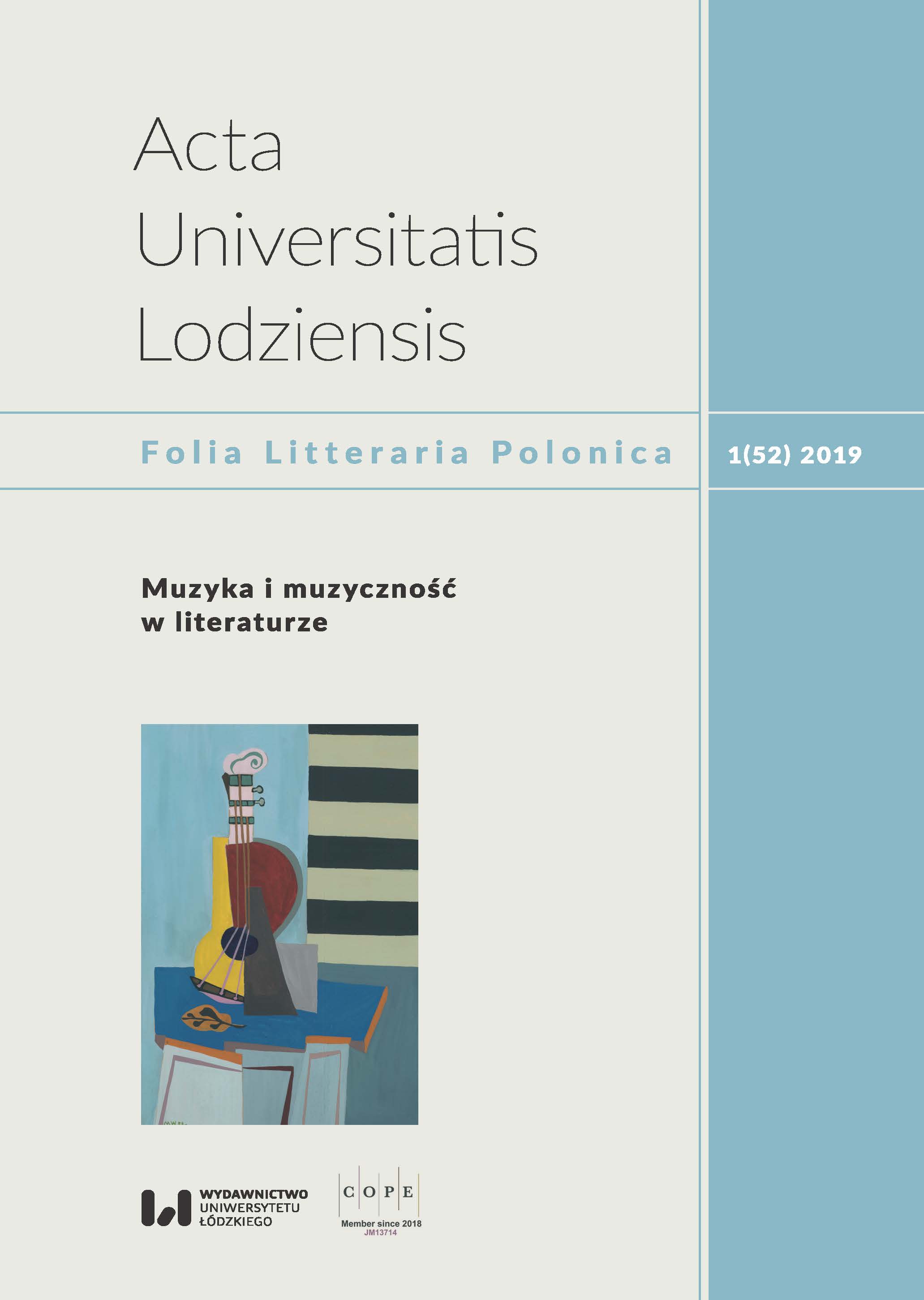Depreciation or admiration? About Zbigniew Herbert’s Violin and Harpsichord
DOI:
https://doi.org/10.18778/1505-9057.52.09Keywords:
Poetry of the 20th Century, Zbigniew Herbert, Musicality, Music in LiteratureAbstract
In Zbigniew Herbert’s early works from the volume Hermes, pies i gwiazda (Hermes, a dog and a star, 1957), one can find cues indicating that contacts with music were his source of ambivalent feelings and reflections. This is evidenced by, among other things, his observations and opinions on symphonic music, expressed in poetic prose Po koncercie (After the concert), as well as considerations regarding the sound of musical instruments in the prose of Skrzypce (Violin) and Klawesyn (Harpsichord). In both these works, one can see the presence of the mechanism of unmasking, characteristic – according to Stanisław Barańczak – of many poetic statements by Herbert, which organizes the works’ construction. The poetic prose of Skrzypce (Violin) initially seems to be the unmasking of the intellectual abuse that “musical reviewers” admit, wanting to explain why violins sound in the special moving way (“cry”). Herbert’s intention, however, is first of all to indicate the reasons that determine the nature of these sounds, causing ambiguous feelings and opinions. In turn, the poetic prose of Klawesyn (Harpsichord) initially seems to be the unmasking of the incompetence of someone looking at the not well-known musical instrument for the first time. However, the poet’s intention is to develop a valuable reflection on the peculiar sounds. These sounds are described figuratively in the last sentence in a way indicating their aesthetic ambivalence (“And there really is only a cuckoo tangled in the thicket of silver leaves”). Herbert’s Considerations of the violin and harpsichord are a way of expressing ambiguous judgments about music. They are also a confirmation of his preference for making poetic statements ambiguous.
Downloads
References
Antoniuk Mateusz, Otwieranie głosu. Studium o wczesnej twórczości Zbigniewa Herberta, Wydawnictwo Platan, Kraków 2009.
Google Scholar
Barańczak Stanisław, Uciekinier z Utopii. O poezji Zbigniewa Herberta, Towarzystwo Przyjaciół Polonistyki Wrocławskiej, Wrocław 1994.
Google Scholar
Czech Adam, Ordynaci i trędowaci. Społeczne role instrumentów muzycznych, Wydawnictwo słowo/obraz terytoria, Gdańsk 2013.
Google Scholar
Drobner Mieczysław, Instrumentoznawstwo i akustyka. Podręcznik dla szkół muzycznych II stopnia, Polskie Wydawnictwo Muzyczne, Kraków 1980.
Google Scholar
Elste Martina, Klawesyn – nostalgiczna maszyna muzyczna. Historia bezprecedensowego renesansu, „Canor” 1994, nr 3 [10], s. 37–44.
Google Scholar
Gloger Zygmunt, Encyklopedia staropolska ilustrowana, Wiedza Powszechna, Warszawa 1978.
Google Scholar
Herbert Zbigniew, Bajki, oprac. Ryszard Krynicki, Wydawnictwo a5, Kraków 2009.
Google Scholar
Herbert Zbigniew, Listy do Muzy. Prawdziwa historia nieskończonej miłości, red. M. Marchlewska, Wydawnictwo Małgorzata Marchlewska, Gdynia 2000.
Google Scholar
Herbert Zbigniew, Skrzypce, Klawesyn, Po koncercie, w: Zbigniew Herbert, Wiersze zebrane, oprac. Ryszard Krynicki, Wydawnictwo a5, Kraków 2008, s. 167, 172, 185.
Google Scholar
Herbert Zbigniew / Elzenberg Henryk, Korespondencja, red. Barbara Toruńczyk, Fundacja Zeszytów Literackich, Warszawa 2002.
Google Scholar
Herbert Zbigniew / Zawieyski Jerzy, Korespondencja 1949–1967, oprac. Paweł Kądziela, Biblioteka „Więzi”, Warszawa 2002.
Google Scholar
Iwaszkiewicz Jarosław, Jan Sebastian Bach, Wydawnictwo Petrus, Kraków 2014.
Google Scholar
Kopaliński Władysław, Słownik symboli, Wiedza Powszechna, Warszawa 1990.
Google Scholar
Pociej Bohdan, Klawesyniści francuscy, Polskie Wydawnictwo Muzyczne, Kraków 1969.
Google Scholar
Sachs Curt, Historia instrumentów muzycznych, przeł. Stanisław Olędzki, Kraków 1989.
Google Scholar
Sacks Oliver, Muzykofilia. Opowieści o muzyce i mózgu, tłum. Jerzy Łoziński, Wydawnictwo Zysk i S-ka, Poznań 2009.
Google Scholar
Downloads
Published
How to Cite
Issue
Section
License

This work is licensed under a Creative Commons Attribution-NonCommercial-NoDerivatives 4.0 International License.











